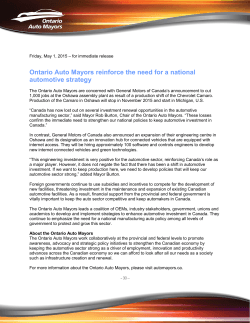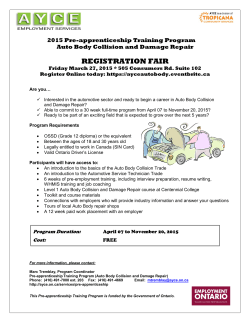
General Motors Corporate News General Motors - GM
Canadian Auto News Watch - Tuesday March 31, 2015 General Motors Corporate News Oshawa GM plants linked to 33,000 jobs, union says; Two assembly plants worth $5B annually to national economy, Unifor report states Byline: Dana Flavelle Toronto Star, Page: S8, Edition: ONT Toronto Star - Tue Mar 31 2015 Union sounds warning on 33,000 jobs Note: Also in The Peterborough Examiner, The St. Catharines Standard , The Toronto Sun, The Niagara Falls Review. Byline: ANTONELLA ARTUSO , QMI QUEEN'S PARK BUREAU CHIEF, Page: B2, Edition: Final The London Free Press - Tue Mar 31 2015 77 victims' families from faulty GM switches to get compensation Note: Also in Montreal Gazette. Source: The Associated Press, Page: B1 / Front, Edition: Early Windsor Star - Tue Mar 31 2015 Investing in auto industry benefits all Byline: MIKE VAN BOEKEL, Page: A4, Edition: Final Woodstock Sentinel-Review - Tue Mar 31 2015 Time to pump the brakes on auto-sector investing Byline: IAN McGUGAN, Page: B2, Edition: Ontario The Globe and Mail - Tue Mar 31 2015 Falling dollar gives lift to Canadian auto sector Byline: GREG KEENAN, Page: B1, Edition: Ontario The Globe and Mail - Tue Mar 31 2015 Return to top General Motors Product News 2015 GMC Canyon SLT 4WD | Driving Permalink: driving.ca... driving.ca - Tue Mar 31 2015 Mark Gravel's electric car in Kitimat, B.C. a 'fit' with lifestyle Byline: CBC News CBC.CA News - Mon Mar 30 2015, 8:00am ET Return to top General Motors Corporate News Oshawa GM plants linked to 33,000 jobs, union says; Two assembly plants worth $5B annually to national economy, Unifor report states Toronto Star Tue Mar 31 2015 Page: S8 Section: Business Byline: Dana Flavelle Toronto Star Ontario would lose up to 33,000 jobs within two years if General Motors' auto assembly plants in Oshawa closed, a study done for the autoworkers union predicts. Canada's economy would shrink by more than $5 billion a year, the report released Monday by Unifor estimates. As well, government coffers would suffer a permanent loss of tax revenues, boosting their deficits by up to $1 billion a year, according to the study by Robin Somerville of the Centre for Spatial Economics, an economic modelling firm. "Canada is a great place for GM to do business, and we all benefit greatly from them being here," Unifor national president Jerry Dias told a press conference. "This underlines why Canada needs a focused strategy to win new auto investment, just like other countries have." The study comes amid growing concerns about the future of GM's two remaining Oshawa plants. A spokesman for GM Canada said no decision about the assembly complex would be made until the end of 2016 following contract negotiations with the union. That's also the year GM's commitment to maintain a specific level of production in Canada - as part of a $10.85-billion bailout by the Ontario and Canadian governments - expires. "We're already in discussions with all three levels of government and with the union as well in terms of things we can do to make sure we're as competitive as we possibly can be," GM spokesman David Paterson said in a telephone interview Monday. Oshawa already has a lot going for it, Paterson said, noting the flex line, which produces the new Impala and three other vehicles, and the paint shop are both "state of the art." The falling Canadian dollar is also helping make Oshawa more competitive with GM's U.S. plants, he said. GM Canada chief executive officer Stephen Carlisle said recently he was optimistic about the outcome of the discussions. Prime Minister Stephen Harper declined to comment on whether his government would invest in Oshawa. However, he noted the government has a $250-million fund earmarked for the auto industry. Harper made the comments during a visit to the Honda Canada plant in Alliston, Ont. Honda Canada said it will begin exporting the CR-V to Europe. No new jobs or additional investments were attached to Monday's announcement at its plants in Alliston, Ont. The company announced an $857-million plant expansion in November, with a 10-per-cent contribution from the provincial government. Government loans and union concessions have become part of the negotiations to secure future investments and jobs. GM's Oshawa plants employ 4,100 people directly, including 3,600 unionized workers, the union said, and thousands of other people indirectly in auto parts and services. Up to 24,000 jobs would be lost immediately if those plants closed, the report for Unifor predicts. Eventually employment would partially rebound, but at lower wages, even for workers not directly employed in the auto industry, the report says. Soaring vehicles sales in North America have fuelled a number of new investments in Ontario auto plants. Earlier this year, federal Transport Minister Lisa Raitt delivered a $50.7-million loan to Linamar, a Guelph, Ont., auto parts manufacturer, alongside Ontario Premier Kathleen Wynne, who committed $50.25 million. GM has announced it would invest $560 million in its CAMI assembly plant in Ingersoll, Ont. Fiat Chrysler Automobiles has committed $2 billion to retooling its Windsor assembly plant. Ford Canada has invested $700 million in its Oakville assembly facility. Ottawa and Ontario each contributed $70 million. Overall, Canadian auto industry production climbed slightly, to 2.38 million vehicles in 2014, as strong North American sales kept most plants running full tilt. But Canada's share of North American production continued to fall, to 14.1 per cent. In the previous four years, Canada had received just $2.5 billion in new auto industry investment, while Mexico got $20 billion, according to the Center for Automotive Research in Ann Arbor, Mich. © 2015 Torstar Corporation Illustration: • A Camaro gets a smudge buffed out on the assembly line at GM's Oshawa assembly plant in Oshawa. STEVE RUSSELL/TORONTO STAR Edition: ONT Length: 630 words Return to top Union sounds warning on 33,000 jobs The London Free Press Tue Mar 31 2015 Page: B2 Section: News Byline: ANTONELLA ARTUSO , QMI QUEEN'S PARK BUREAU CHIEF general motors noted on Tue Mar 31 2015 5:59 Also in The Peterborough Examiner, The St. Catharines Standard , The Toronto Sun, The Niagara Falls Review. am ET TORONTO -- Ontario is at risk of losing up to 33,000 jobs within two years of any shutdown of the Oshawa GM complex, says a study released by the union that represents autoworkers. Unifor National President Jerry Dias said governments must directly invest in the auto sector to keep the industry alive in Canada. "Oshawa won't survive unless both the federal and provincial governments are prepared to play," Dias said Monday. "There is no successful auto industry anywhere in the world that is successful in isolation of government. Governments need to play a leadership role." The study, Economic Impact of GM Operations in Oshawa, estimates Ontario would lose 22,000 to 24,000 jobs immediately and up to 33,000 jobs during two years if GM shutters its operations. Dias said anyone who dismisses investment in the auto industry as corporate welfare doesn't understand the economic benefits. Oshawa GM boosts the country's GDP by $5 billion a year, directly and through spin-off economic activity, and a $1 billion investment by governments would likely keep it open for at least a couple more decades, he said. "It's called economic suicide not to participate and that's what the study shows," Dias said. The future of GM in Oshawa is believed to be in doubt beyond 2016 unless the company commits to the production of a new product. Ontario Economic Development Minister Brad Duguid said his government is interested in partnering with the federal government to keep GM in Oshawa. "I'm very hopeful," Duguid said. "I can tell you right now getting that future mandate for GM Oshawa is our No. 1priority. " It's too soon to discuss how much the Ontario government would be prepared to put into GM, he said. Dias said both the provincial and federal governments have been willing to talk investment with GM. © 2015 Sun Media Corporation. All rights reserved. Illustration: • QMI AGENCY FILE PHOTO • Without government investment, GM's Oshawa plant could close costing 33,000 jobs, the union warns Edition: Final Length: 294 words Return to top 77 victims' families from faulty GM switches to get compensation Windsor Star Tue Mar 31 2015 Page: B1 / Front Section: News Dateline: DETROIT Source: The Associated Press general motors Also in Montreal Gazette. noted on Tue Mar 31 2015 5:57 am ET Families of at least 77 people killed in crashes caused by defective General Motors ignition switches will get compensation from the company. Attorney Kenneth Feinberg, who was hired by GM to compensate victims, updated the total Monday. It was up from 74 last week. An additional 141 injured people also are eligible for compensation. The fund received a total of 4,342 claims by the Jan. 31 deadline. Of those, 1,263 are still under review. Feinberg says more than half are ineligible or lack documentation. GM knew about problem switches in Chevrolet Cobalts and other small cars for more than a decade but recalled them only last year. They can slip out of the "on" position, which cuts off the engine, knocks out power steering and turns off airbags. © 2015 Postmedia Network Inc. All rights reserved. Edition: Early Story Type: News Length: 122 words Return to top Investing in auto industry benefits all Woodstock Sentinel-Review Tue Mar 31 2015 Page: A4 Section: Editorial/Opinion Byline: MIKE VAN BOEKEL The auto industry has brought many benefits to our local communities and to Canada as a whole. Most obvious, there are the jobs. The GM Assembly Plant in Ingersoll provides good quality jobs to support local families and local businesses now and into the future. Through negotiations, the plant has been able to create a large number of full-time jobs with benefits and pensions, improving employment prospects across the region. While at the same time, we have brought in programs to allow workers the opportunity to spend more time with their families. This all adds up to some pretty significant benefits of a major auto plant in Ingersoll, but there's more. Those who have retired from the Ingersoll plant continue to bring benefits to the area. Having retired with a decent pension that a good auto industry job provides, they have been able to retire with dignity and continue contributing to the local economy. But perhaps the best thing about having a strong auto presence here is the promise of jobs for future generations. That gives our children the chance to build lives in the place where they were raised, gand the community the security it needs to prosper. Throughout the area, many others benefit from the auto industry, as well. That's because every job in an auto plant creates nine more jobs in the broader community -suppliers to the plant, contractors and others serving the plant directly. Jobs are also created every time a worker spends his or her wages, buys a home, food, or even saves for our children's' education at the local bank. As well, each of these workers pays federal and provincial taxes that help support such things as healthcare and education, as well as local property taxes that pay for infrastructure such as local parks and road plowing. With more than half of CAMI's workers living in Woodstock and London, the benefits of having the plant in our region are spread far and wide. The GM Ingersoll plant supports many charities including contributions of $580,000 to the United Way in 2014, supports the Christmas Hamper program through donations and volunteering which helps to provide much-needed donations to local families during the Christmas season, and supports the Fusion Youth Centre for area teens. Following the 2008 economic crisis, both the Canadian public and Unifor members helped ensure General Motors and other car companies were able to weather the storm. General Motors and the other automakers in Canada provide those good jobs because this is a good place for them to do business. Canadian auto workers provide the highest levels of quality, efficiency, productivity and innovation in the world. Several recent investments and expansions in Ontario's auto industry are proof that the companies continue to see Canada as a good place to invest, including GM in Ingersoll, Ford in Oakville, Chrysler in Windsor, Honda in Alliston, Toyota in Cambridge and Woodstock, and Linamar in Guelph. The benefits to all Canadians of having the auto industry here is shown in a study released this week; Economic Impact of GM Operations in Canada. The study's lessons apply well beyond Oshawa. Auto manufacturing provides a big boost to Canada's Gross Domestic Product, provides much-needed tax revenue to support such services as health care and education, and bolsters the Canada Pension Plan. The report found that if the Oshawa plant was to close, the federal and Ontario governments would see both a permanent loss of revenues and an increase in their deficits of more than $1 billion a year. The report also found there would be significant implications for the CPP as a result of the loss of contribution revenue, which would require significant increases in contribution rates or cuts in benefits. It is vital that Canada develop an ongoing and workable plan to encourage growth in the auto industry -as other countries have already done for themselves. This industry is too important to Canadians, the economy, and our community, to have it any other way. © 2015 Sun Media Corporation. All rights reserved. Edition: Final Note: Mike Van Boekel is Unifor Local 88 Plant chairperson at GM Ingersoll, CAMI Assembly plant in Ingersoll. Length: 661 words Return to top Time to pump the brakes on auto-sector investing The Globe and Mail Tue Mar 31 2015 Page: B2 Section: Report on Business Byline: IAN McGUGAN It's tempting to look at surging vehicle sales in Canada and the United States and conclude that the global auto industry is bursting out of its post-financial-crisis funk and poised to accelerate. Not so fast. Car sales have rebounded strongly since the trough of the Great Recession, but global auto makers are still not covering their cost of capital - and it seems unlikely they will any time soon. For investors, the gap between car makers' return on invested capital and their cost of capital suggests caution is in order. For governments and for voters, the financial shortfall means that auto makers will probably press even harder for subsidies and tax breaks. But it also raises questions about the wisdom of subsidizing an industry that is unlikely to regain its past prosperity. The sorry state of the auto sector is outlined in a recent analysis by Aswath Damodaran, a professor of finance at the Stern School of Business at New York University and an internationally recognized authority on corporate valuation. Calculations shown on his blog, Musings on Markets, indicate that global auto makers have managed to produce returns that exceed their cost of capital in only one year - 2005 - of the past decade. Prof. Damodaran estimates that among the world's 10 largest car makers, only one - Audi - earned a return on capital in 2014 that was higher than its cost of capital. "The typically large automobile company in 2015 is a highly levered behemoth, which struggles to earn enough to cover its cost of capital in a market with anemic revenue growth," he writes. The financial gap that Prof. Damodaran has identified doesn't mean that auto companies are losing money. It just means they're not producing enough in the way of returns to satisfy investors with a normal appetite for earning a buck. A company's cost of capital reflects a weighted average of its after-tax borrowing costs and the returns that equity investors can expect to reap from shares in investments of similar riskiness. When a company's return on invested capital falls short of its cost of capital, it's not producing value in comparison with opportunities elsewhere. Profit-seeking investors head for the door. In most industries, an exodus of investors acts as a signal for consolidation. Strong players snap up weaker players. The takeovers reduce capacity until profit margins strengthen and returns once again rise above the cost of capital. In the auto industry, though, companies are often regarded as national champions. Many receive government support because of their supposed value as job creators and technology hubs. As a result, it's unlikely the current storm of competition will ease of its own accord. Given the car industry's broken business model and poor profitability, Prof. Damodaran sees it as ripe for disruption by companies in healthier industries. Google or Apple, for instance, might invade the market with offerings that complement their products in other areas. Of course, that would not be good news for aging car makers that are already struggling to cover their cost of capital. "If there is a light at the end of the tunnel for incumbent automobile companies, I don't see it," Prof. Damodaran writes. © 2015 The Globe and Mail Inc. All Rights Reserved. Edition: Ontario Length: 528 words Return to top Falling dollar gives lift to Canadian auto sector The Globe and Mail Tue Mar 31 2015 Page: B1 Section: Report on Business Byline: GREG KEENAN Total labour costs at Detroit Three plants in Canada have fallen to levels below those at the companies' U.S. factories, a sign the falling value of the Canadian dollar is helping improve this country's competitive position in the auto sector. All-in labour costs - which include wages, benefits and pension costs - at the Canadian plants operated by the companies average $60 an hour, putting them below $48 (U.S.) with the dollar trading at 79 cents, said Jim Stanford, economist for Unifor, which represents hourly workers at FCA Canada (formerly Chrysler Canada Inc.), Ford Motor Co. of Canada Ltd. and General Motors of Canada Ltd. At less than $48, hourly labour costs at the Canadian plants are also lower than Honda Motor Co. Ltd. and Toyota Motor Corp. factories in the United States, according to data compiled by the Center for Automotive Research (CAR), an industry think-tank based in Ann Arbor, Mich. While the currency advantage helps, the changing work force at General Motors Co. plants in Oshawa, Ont., will be an even bigger advantage than the dollar, Unifor officials said Monday as they released a report that examined the impact a closing of GM's two Oshawa plants would have on the federal and Ontario economies. "The decline in the dollar is almost icing on the cake," Mr. Stanford told a news conference. The report, released at the Ontario legislature, comes as Unifor lobbies the Ontario and federal governments to help save the Oshawa plants, one of which is scheduled to close next year. The other plant has no new vehicles allocated to it and the vehicles made there are scheduled to be shifted elsewhere or end production during the next few years. GM Canada President Stephen Carlisle has said no decision on new vehicles will be made until 2016. About two-thirds of unionized workers at the Oshawa plants are eligible to retire under the provisions of the Unifor contract with GM, Unifor president Jerry Dias said. "This will save General Motors billions," Mr. Dias said. If those workers retire, they can be replaced by newly hired employees who start at $20.50 (Canadian) an hour and whose wages won't rise to the full seniority level of $34 an hour until they have been there 10 years. They also participate in a hybrid pension plan that combines defined contributions by GM with defined benefits to employees instead of the more costly plan for employees with more seniority, which is 100-percent defined benefit. At current levels the currency advantage Canadian plants have over U.S. plants also makes newly hired Canadian workers less costly than so-called tier two workers at U.S. factories, Mr. Stanford said. The all-in labour costs for lower-tier workers at U.S. Detroit Three factories are about $42 (U.S.) an hour, CAR estimates. Costs for newly hired workers at Canadian plants are about $30 (Canadian), Mr. Stanford said. Mr. Dias said he expects the cost gap to grow in Canada's favour during talks between the Detroit Three and the United Auto Workers this year as the UAW looks to eliminate the lower tier of pay and regain increases in hourly wage rates, which have been frozen. The report on GM Oshawa, prepared by the Centre for Spatial Economics, said closing the two plants would result in the immediate elimination of 4,100 jobs, the loss of more than 30,000 jobs over the medium term and a revenue hit of about $1-billion to the Ontario and federal governments. The report "underscores what we know and that is that our auto plant - just like any auto plant - is very important, with its supply chain, both for economic importance and to governments," GM Canada vicepresident of corporate affairs David Paterson said. © 2015 The Globe and Mail Inc. All Rights Reserved. Edition: Ontario Length: 612 words Return to top General Motors Product News 2015 GMC Canyon SLT 4WD | Driving driving.ca Tue Mar 31 2015 View original item at driving.ca...» Mark Gravel's electric car in Kitimat, B.C. a 'fit' with lifestyle CBC.CA News Mon Mar 30 2015, 8:00am ET Section: British Columbia Byline: CBC News A small electric car may not be the first vehicle choice for many people in northern B.C., where large pick-up trucks rule the road, but Kitimat's Mark Gravel says his northern lifestyle is the reason he got a Chevrolet Volt. "We try to have a small footprint. We try to produce our own eggs. We try to produce our own produce and what not and I guess it just fit in with our values," Gravel told Daybreak North's Carolina de Ryk. The car's battery will take Gravel about 70 kilometres, and a gas-powered generator gives him an additional 450 kilometres for about 25 litres of fuel. Gravel admits the car is "not the greatest" on back roads, but is hopeful as electric cars become more popular, there will be more options for rugged terrain. "The only big challenge is when we get the big snow dumps. When we get the big snow dumps you can't use them. So we have a pick-up as a back-up," he said. Electric cars haven't taken off in B.C.'s northwest ? Boyd McCann, a sales representative at MacCarthy Motors in Terrace, B.C., told the CBC, the dealership sold one electric vehicle and leased another two years ago, but hasn't sold one since. Gravel was the one customer who took out the lease, and now with the lease almost up, he plans to buy the car. "It's such a comfy ride too. It's a nice car. It's an excellent car to drive. It's got a lot of torque. It's fun," he said. Take our poll on owning an electric car To hear the full interview with Mark Gravel, click the audio labelled: Mark Gravel's electric car. © 2015 CBC. All Rights Reserved. Length: 280 words Return to top Return to top
© Copyright 2025









